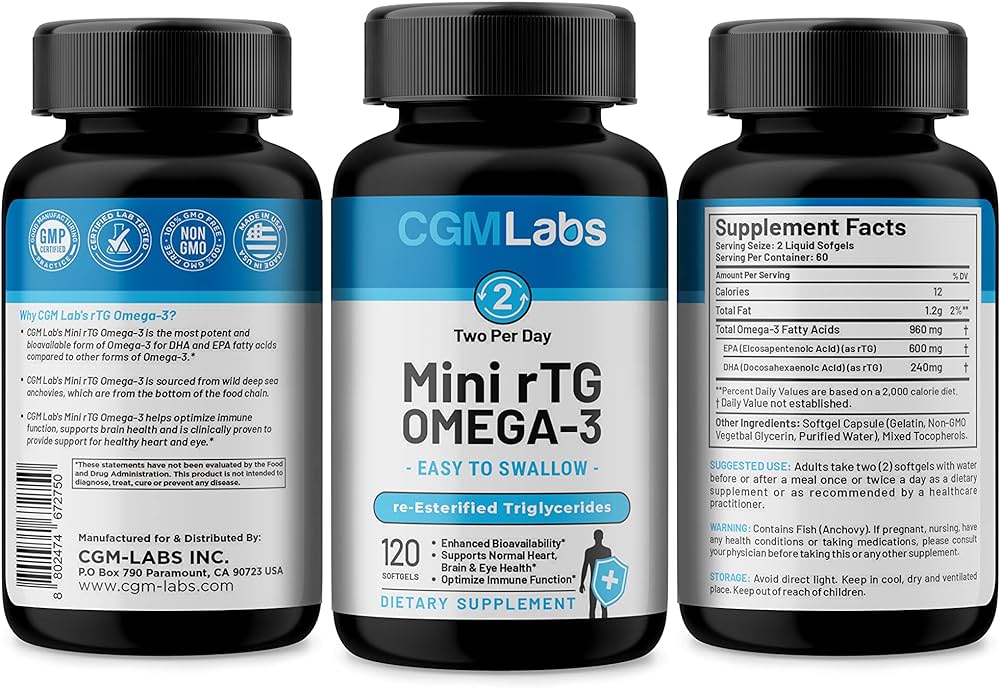 |
|
Although no adverse events were noted with taking the dietary supplements, no benefit of the rTG form of omega-3 fatty acid was found in ameliorating DED signs by theoretically reducing inflammation in the plasma or ocular tissues. Photo: CGM Labs. Click image to enlarge. |
Researchers in South Korea recently investigated whether the systemic re-esterified triglyceride (rTG) form of omega-3 fatty acid supplementation was effective in treating dry eye disease (DED) associated with MGD, compared with grapeseed oil supplementation (which has an antioxidant effect) using antioxidant foods that can be consumed in daily life as a control group. Their findings, which were published last week in JAMA Ophthalmology, did not show that supplementation of the rTG form of omega-3 fatty acid for 12 weeks was different from the control group taking grapeseed oil for ameliorating signs of dry eye by theoretically reducing inflammation in the plasma or ocular tissues. However, the supplementation did suggest greater changes in upper and lower eyelid telangiectasia and eyelid wiper epitheliopathy grades than with grapeseed oil.1
This double-masked, parallel-group randomized clinical trial was conducted at seven institutions with a total of 132 patients (mean age, 50.6 years; 78.0% women). The mean baseline OSDI scores of the omega-3 and grapeseed groups were 43.5 and 44.1, respectively. The study notes that 87.9% and 86.4% in the omega-3 and grapeseed groups, respectively, completed the 12 weeks of follow-up. The primary endpoint was the Ocular Surface Disease Index (OSDI) from baseline to six and 12 weeks.
The research team found no differences in compliance with the dietary supplement intake between groups (omega-3, 95.8% and grapeseed, 95.4%). The OSDI change from baseline to six and 12 weeks was -20.5 and -22.7, respectively, in the omega-3 group and -15.1 and -18.8, respectively, in the grapeseed control group (difference at six weeks = -5.4 and at 12 weeks = -3.9). There were no changes in safety parameters or adverse events related to taking the dietary supplement in either group. Still, fewer than 60 participants were evaluated in each group.
“Although the amount of change in OSDI in each group was greater than the minimal clinically important difference suggested in the previous research, the difference in the OSDI change between groups was smaller than the minimal clinically important difference,” the researchers wrote in their paper.
Despite no differences in upper meibomian gland dropout change between groups, there was a difference suggested for the lower meibomian gland dropout changes between groups, which the study authors emphasized as a hypothesis-generating conclusion that warranted future clinical trials to determine this efficacy.
“In this study, lower meibomian gland dropout was possibly only exacerbated in the grapeseed group,” the researchers wrote. “Therefore, ω-3 supplementation could not improve meibomian gland dropout, but it might prevent the worsening of meibomian gland dropout in DED associated with MGD if future clinical trials can compare this.”1
A commentary also published in JAMA Ophthalmology highlighted that “the duration of follow-up was only 12 weeks, so it is unclear how these participants would have fared with longer durations of omega-3 supplementation. However, 12 weeks is also the median duration of follow-up in pivotal randomized, clinical trials submitted to the US FDA for approval of topical treatments for dry eye.”2
As the study was able to suggest that omega-3 supplements may be associated with improvements in other secondary outcomes, the commentary author wrote that “more work may need to be done before the field makes a firm conclusion and fully closes the chapter on omega-3 fatty acid supplements for patients with evaporative dry eye.”2
1. Eom Y, Jun I, Jeon HS, et al. Re-esterified triglyceride ω-3 fatty acids in dry eye disease with meibomian gland dysfunction. JAMA Ophthalmol. May 16, 2024. [Epub ahead of print]. 2. Saldanha IJ. ω-3 fatty acid supplements may not improve dry eye symptoms. JAMA Ophthalmol. May 16, 2024. [Epub ahead of print]. |


